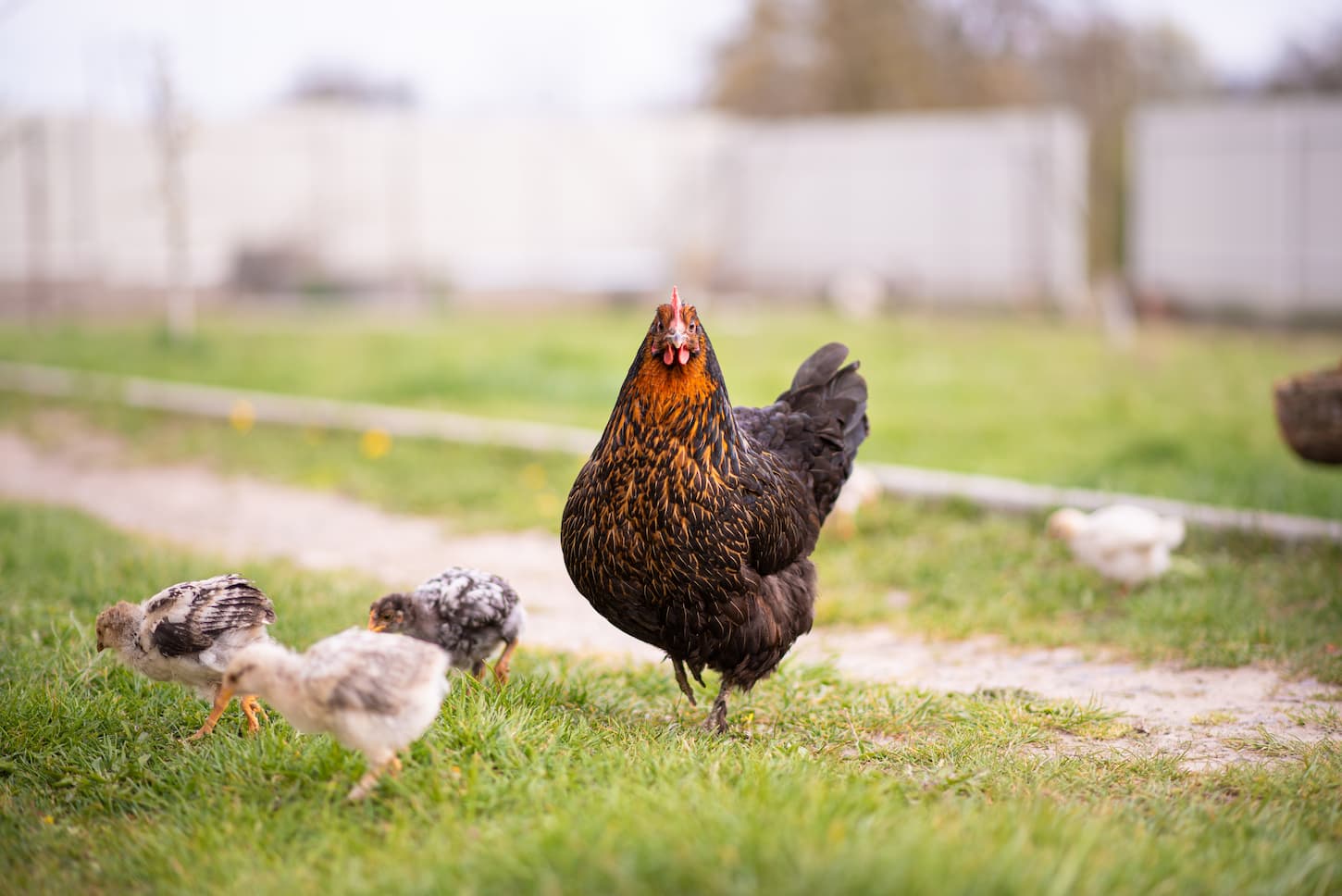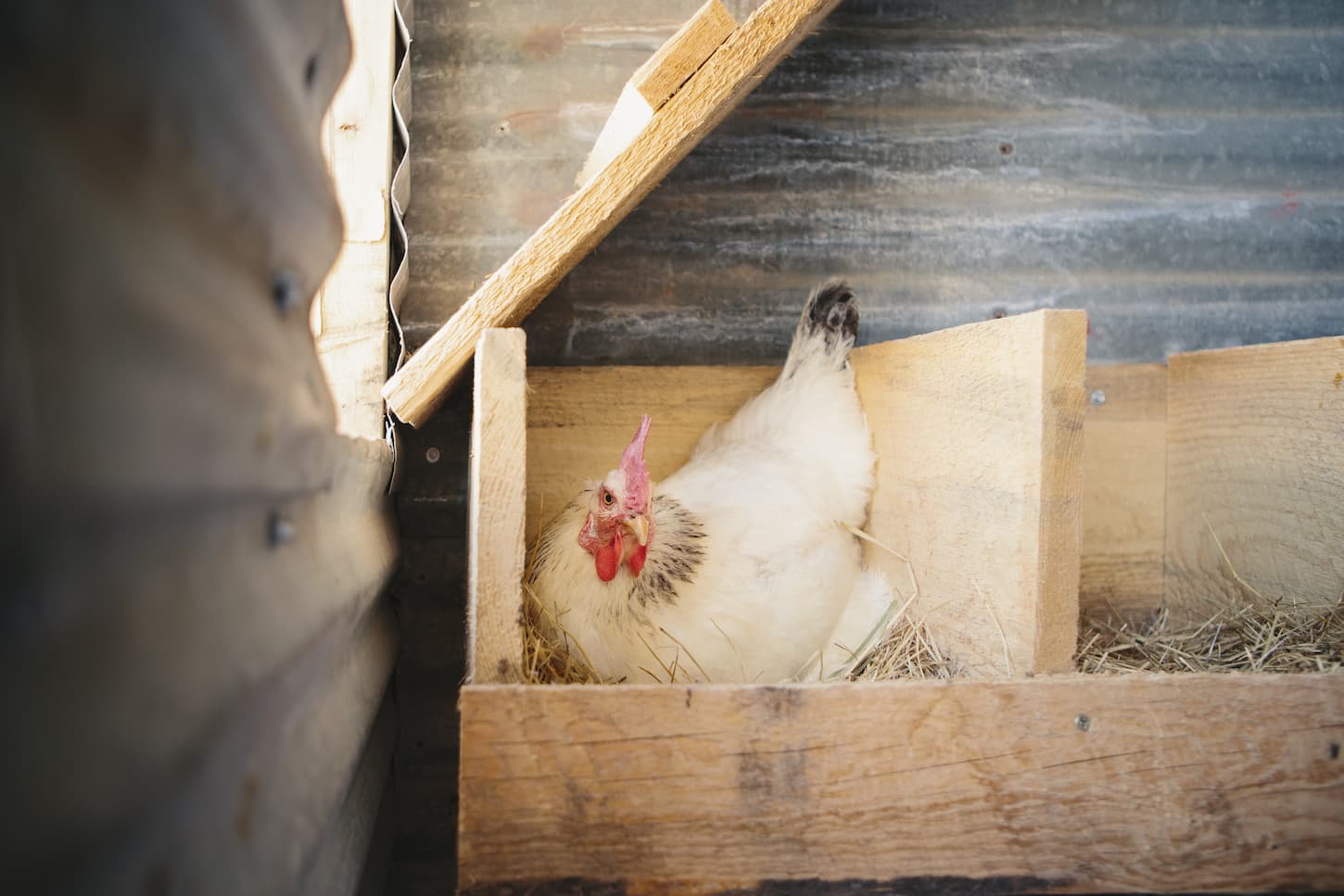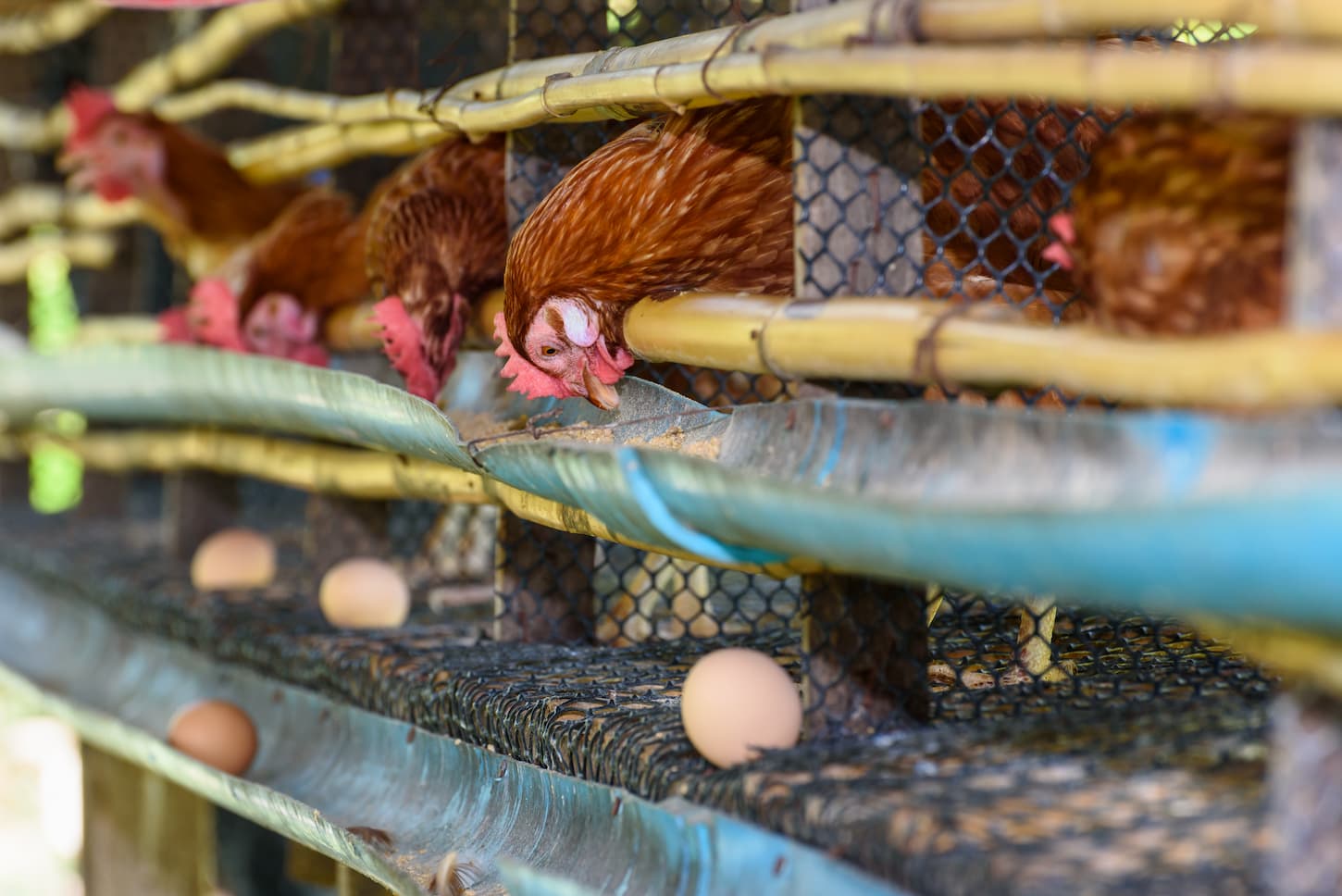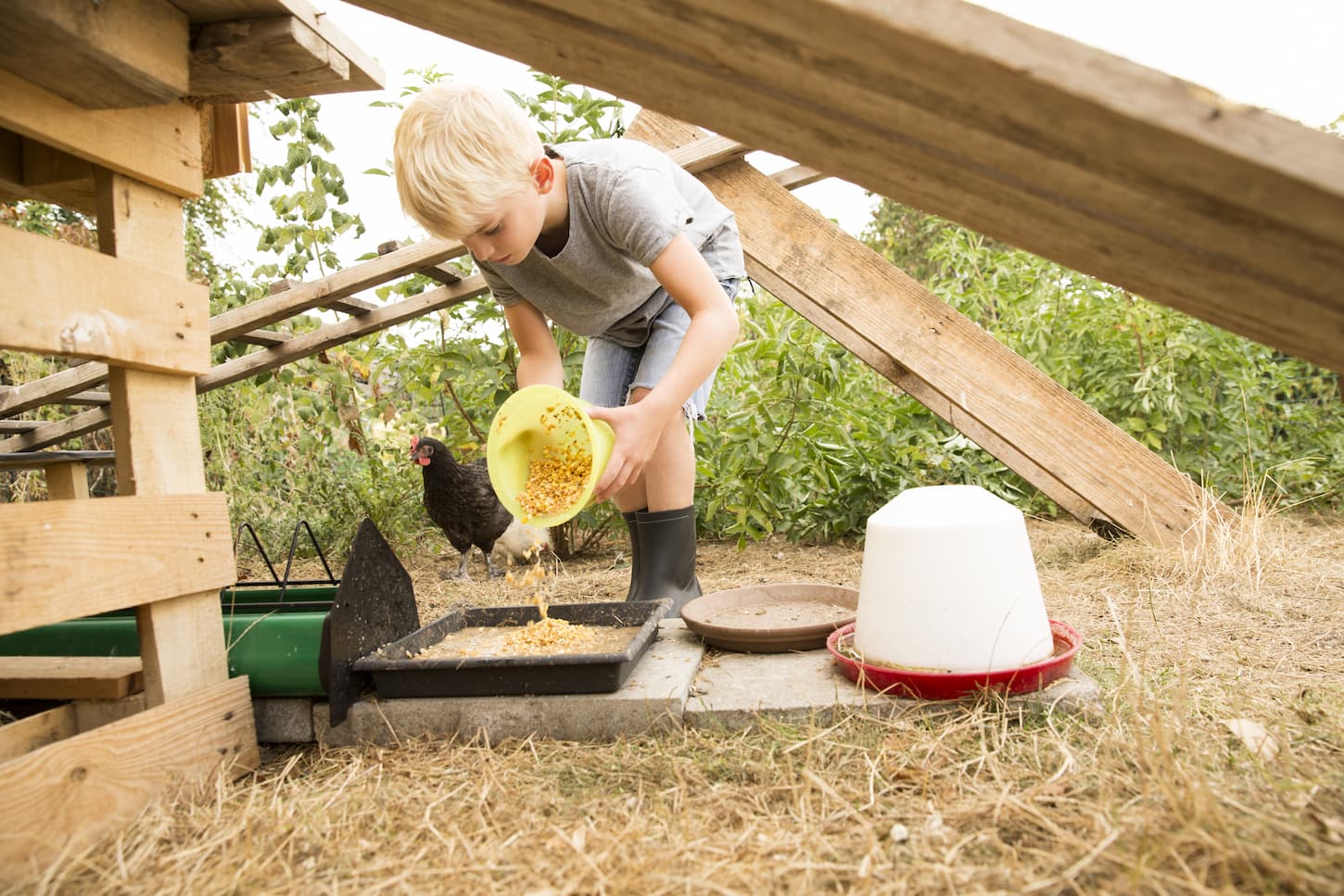No homestead would be complete without a flock of chickens roaming the yard and fresh eggs on the counter every day. However, sometimes a chicken might stop laying because of the season or something in her environment. Chickens will also stop laying eggs when they’re broody.
Broodiness is a normal part of hen behavior. A hen will become a broody when she wants to have babies. A broody chicken will sit on its nest almost constantly. She’ll only leave once or twice a day, briefly, for food and water.
Broodiness can be infectious, and if all your hens go broody at once, you can say goodbye to fresh eggs for a while. As a backyard homesteader, it’s good to know how to deal with broodiness to keep the hens laying.
To take your chicken-keeping skills to the next level, take a look at our complete guide to broody chickens.

What Is a Broody Chicken?
A broody chicken has a sudden hormonal urge to have and raise babies. Lots of things, including age, breed, season, and environment, can make a hen go broody. A broody hen will stop laying and focus all her time and energy on incubating eggs.
Chickens usually go broody in the springtime because of the extra warmth and sunlight. Age, hormones, and genetics also influence a hen’s breeding cycle. Hens in their first laying season rarely get broody, and some chicken breeds don’t get broody at all.
A chicken is broody when she stops laying eggs and spends most of her time in the nesting box. She might get agitated or even try to peck at someone who is trying to move her.
When she’s broody, a chicken will sit on another chicken’s eggs, and she’ll even sit on nothing at all. It’s distressing to watch a broody hen determinedly trying to incubate eggs that will never hatch.
If there is no rooster around, the eggs are infertile and won’t produce chicks. If the eggs are fertile, it’s a good idea to consider whether or not your homestead can accommodate more babies before allowing your hen to hatch them – remember, half of the chicks might be males.
What are the Signs of a Broody Hen?
The main sign of a broody hen is her refusal to come out of her nesting box. She may also become defensive over her territory and be aggressive towards people and the other chickens if they get too close. A broody hen may also pull out her chest feathers.
Sometimes, a chicken might stay in her nesting box because she feels like some quiet time and not because she’s broody. If your chicken is broody, she’ll show some of these signs:
#1 – Broody hens are glued to the nesting box
A broody chicken will usually take up camp in the quietest, safest, darkest nesting box. Once she’s in there, she will lie very flat in the box, and won’t leave for anything, not even to roost with the rest of the flock at night.
She’ll only venture out about once a day for a snack, drink, and the toilet.
#2 – Broody hens are territorial
A broody chicken will be very territorial, and if other chickens get too close, she’ll fluff her feathers out, squark and might even peck. She’ll usually be antisocial with the flock when she ventures out to get food and drink as well.
#3 – Her condition might deteriorate
When hens are broody, their only focus is to sit on their eggs and keep them warm. Chicken eggs need to be constantly warm, so a broody hen rarely leaves her eggs for more than 10 minutes at a time.
Chicken eggs also make a good snack for some wild animals, so the mother hen needs to be around to defend her eggs from predators too. A hen is so determined to keep her eggs safe and warm that often she’ll neglect her health.
She might lose weight and end up in poor condition if she doesn’t eat properly, and will usually pluck out feathers from her chest and belly. A broody hen might have a pale comb or wattles, and her droppings will be infrequent, large, and smellier than normal because she’s eating less.
What Time of Year Do Hens go Broody?
Hens usually go broody in the spring or early summer, but in warmer climates, potentially they can go broody at any time of year. However, a chicken will rarely go broody in the middle of winter.
A hen can go broody anytime, and you can’t predict when it’ll happen. However, like most animals, chickens prefer to raise their babies in warm weather, so broodiness is more common in the spring.
When the days get longer, animals have hormonal responses to the extra daylight, which can make them very broody. In the winter the reduced light means a hen will rarely go broody, even in warm climates.
Note: our Buff Orpingtons are a breed known to go broody. And boy howdy, one of our two is pretty much always broody. She loves incubating any eggs she can find! She sleeps in the nesting box, too.

How Long Will a Chicken Stay Broody?
A hen will usually stay broody for around 3 to 6 weeks until her eggs hatch. However, if the hen is sitting on infertile eggs which don’t hatch after three weeks, she may stay broody for longer.
It takes around three weeks for a chicken egg to hatch, but a chicken will usually brood for 3 to 6 weeks. A chicken needs to lay her eggs before she sits on them which can take two weeks. She might also feel a bit broody for a week or two before she decides to make a nest.
Many chickens will snap out of their broodiness if they don’t have chicks after 3 or 4 weeks of sitting in their nest. However, if you have a broody chicken breed or one who’s particularly determined about being a mom, they might sit on their eggs indefinitely.
What helps snap our hens out of being broody are a few things, which I’ll talk about in a couple of sections down. So keep reading!
Do Broody Hens Still Lay Eggs?
Broody hens do not lay eggs. One of the main problems with broody hens is that they don’t lay eggs. The main focus of a broody hen is sitting on eggs to incubate them rather than egg production.
Broody hens will lay eggs in the first couple of weeks but only so they can sit on them. Once they have around 10 or 12 eggs, they won’t lay anymore. Broody hens will usually start laying eggs again around 7 days after their broodiness has passed, but it can take up to a month in some cases.
It’s bad enough if there is one hen off laying – broodiness can be contagious, and if all the hens get broody at the same time, there won’t be any eggs at all. If you have a broody hen and you don’t want babies, everyone should try and snap her out of her broodiness.
How do you Stop a Hen from Brooding?
To stop a hen from brooding, remove eggs from nesting boxes daily. If the hen is sitting on eggs, remove her from the box several times a day to try and break her broody habits. If this fails, try to block her nesting box or even isolate her from the rest of the flock.
If you don’t want baby chicks, a broody hen isn’t really any help around the homestead because she won’t lay eggs, and she’ll be aggressive and cranky. If a hen is broody, her health will suffer too.
To get your chicken to quit being broody and start laying eggs, give the following steps a try.
Step #1 – Assess your chicken’s living environment
Boredom can lead to broodiness. If there is a lot of broodiness in the flock, reevaluate their living conditions. Make sure the chickens have enough space and lots of mental stimulation. Add a few boredom breakers such as ladders, perches, or a dust bath to your run.
Need to cool down your chicken coop during the summer? Read this article I wrote on how to do that: How to Keep a Chicken Coop Cool in the Summer.
Step #2 – Collect eggs daily
Egg collecting should be a part of your daily chicken care routine. It’s better to collect eggs early, just after all the chickens have laid. The sight of a pile of eggs without a mom is enough to make some hens broody.
Step #3 – Remove the hen from her nest
Sometimes, a broody chicken will sit on a nest even if there aren’t any eggs to sit on. If you’ve removed the eggs and the hen insists on sitting, physically remove her from the nest – several times a day if necessary.
Remove her at feeding times to try and distract her. Always use long sleeves and protective gloves if the hen is aggressive. If the hen doesn’t get the message during the daytime, remove her from the nest just before dark.
Place her in the coop to roost with her friends, and she probably won’t be brave enough to go back to the box alone at night.
Step #4 – Make the nest cold
Broody hens have a higher body temperature because they need to keep their eggs and babies warm. If you cool down a broody hen, it might help her snap out of it. Hens will often pluck their feathers from their chest to give more warmth to the eggs through direct skin contact.
Place something cold in the nest, such as a bag of ice, frozen vegetables, or a frozen water bottle – the cold shock might put her off the nest. If not, when she sits on the ice it will at least bring her temperature down.
Alternatively, give the hen a cool bath to reduce her body temperature. Only cover her legs and underside with water and bathe her for around 5 minutes. Stop bathing the chicken if she gets distressed – stress will only make her hotter.
Step #5 – Block the nest
If a hen doesn’t have access to her nest, she can’t be broody over it, so block the nest up if the chicken keeps returning to it. Remove the straw from the box too, so it’s uncomfortable in case she manages to break back in.
Step # 7 – Put her in an isolation cage
If a hen is broody for too long, her health will suffer, so in extreme cases, you might have to send your hen to jail. To make a chicken jail, use a small cage such as a dog or cat crate – it must have a wire bottom for the droppings to fall through.
Only put food and water in the cage, and don’t add any bedding. Don’t leave the hen in the cage for more than three days. If she lays an egg while she’s in the cage, go ahead and let her out because this is a sign she isn’t broody anymore.
After three days, release the hen – if she goes straight back to the nesting box, then the jail time will need to be repeated. If she runs to the flock, congratulations, she’s not feeling broody anymore.

Can I Leave My Broody Hen in the Coop?
It’s okay to leave a broody hen in the coop, but it’s a good idea to add some extra nesting boxes for the other hens to use. If a broody hen is sitting on fertile eggs and expecting chicks, it’s usually safer and more convenient to section the broody hen and her eggs off.
Hens will happily raise their babies among the flock, but if it’s the hen’s first time having babies, it’s better for you both if you do it in a separate coop until you get more experience.
Plan on segregating a part of the existing coop for mothers and babies or making them a special brooder pen somewhere else. Many chicken owners use a large rabbit hutch as a brooder pen.
In the coop, other hens might chase a broody hen off her eggs, and if she’s away too long, the eggs will fail. Also, other chickens may come and lay eggs on the nest while she’s off eating.
If the broody hen is raising her eggs in the coop, mark them with a dot so you can tell them apart from fresh ones. If you don’t collect extra eggs, there will be too many in the nest and they won’t develop properly.
Can I Move a Broody Hen and Her Eggs?
If a hen has made a nest in an inconvenient or unsafe place, move her somewhere else. However, hens will choose their nesting place very carefully, and when moving a broody hen and her eggs, there is a chance she might go off brood.
Before moving a broody chicken and her eggs, make sure to have everything well prepared in her new home. The chicken will be less distressed if it’s a quick, smooth transition. Make the move in the evening – your chicken will be more docile then and will find the move less distressing.
Move the eggs first and the chicken after so she doesn’t try and bolt back to the nest. When putting the chicken back with her eggs, don’t put her directly on them because she might thrash out and damage the eggs. Place her to the side of them instead.
How do you Encourage a Broody Hen?
A hen cannot be forced to be broody, but she can be encouraged. If there is a particularly broody hen, she may become broody with a few simple prompts, such as a safe, cozy nesting area with a clutch of dummy eggs inside.
A broody hen isn’t always a bad thing, especially if you want to increase your flock size. Instead of incubating eggs and raising chicks under lights, it’s much easier to let a mother hen do all the work.
She’ll protect her babies and keep them warm, and teach them how to be chickens. According to a study in 2010, chicks with a mother hen develop more natural chicken behaviors and are less fearful.
If you need a broody hen to help raise baby chickens, use the following steps to try and make one of the hens broody.
Step #1 – Encourage broodiness in the spring
It’s pretty much impossible to make a hen go broody in the winter because it goes completely against her instinct. If you want to try and make a hen broody, always start in the spring or early summer to fit with a hen’s natural cycle.
Step #2 – Target the right hen
For the best chances of success, choose a hen that tends to be broody anyway. Use an older hen because even though young chickens can go broody, they generally won’t in their first laying season.
Ask yourself if there are flock members who were particularly broody last year? There is a much better chance of encouraging a hen to be broody if she’s broody by nature.
Also, be aware that some hens might show signs of broodiness, but when the time comes, they’re not good at raising chicks, so always have a backup plan in place.
Step #3 – Use dummy eggs
Hens will be more inclined to get broody if they find eggs in a nest. Collect the fresh eggs every day, and leave some dummy eggs in the nesting boxes instead of fresh ones. Use golf balls, plastic eggs, wooden eggs, smooth stones, or clay eggs to imitate real eggs in the nesting box.
Step #4 – Make a breeding coop
Create a special nesting area that’s cozy with thick fresh bedding, in a dark and private area. Place some dummy eggs in the nest and leave food and water nearby. If you provide the ideal nesting conditions, it might help some hens get in the mood.
Step #5 – Add eggs or babies
Once the hen is in the full brood, give her fertile eggs to sit on if you want her to raise a clutch of chicks. Swap the dummy eggs for fertile ones during the night when the hen is less aware of what’s happening.
How do You Take Care of a Broody Hen?
A broody chicken’s life can be made more comfortable by moving her food and water close to her and giving her lots of privacy. Broody hens often neglect themselves, and as a result, their health can suffer. Broody chickens can even starve to death in extreme cases.
If her food and water are closer, a hen will take more time eating and drinking because she can still see her eggs, and she might come out to eat more often too. If you don’t see her eat or drink, move her out of the nest once a day for food and water.
Chickens usually won’t take dust baths when they’re sitting on eggs, so check a broody hen for lice and mites and treat her accordingly if you find any. You can also supplement her diet with nutritious treats such as scrambled eggs or mealworms.
What Breed of Chicken Goes Broody the Most?
Breeds such as Brahmas, Buff Orpingtons, and Cochins will get broody at the drop of a feather, while some hybrid chicken breeds will hardly ever go broody. Some breeds are much broodier than others, and genes play a huge role in dictating how broody a chicken will be.
Most hens will go broody, but not all of them. Broodiness has been bred out of many breeds because it isn’t welcome on commercial farms – it’s not cost-effective to have a hen “off lay”. Most commercial chickens are hybrid breeds that hardly ever go broody.
If you want a sustainable flock on your homestead, it’s good to have at least one broody breed. A good brooding hen will rear one or two clutches per year.
Here’s a list of ten of the broodiest chicken breeds:
- Buff Orpingtons
- Brahma
- Sussex
- Chantecler
- Cochins
- Silkies
- Cubalaya
- Orpington
- Dorking
- Dominique
- Marans
- Icelandics
Best Products for Broody Chickens
Sometimes having the right equipment makes all the difference. It really does! Make sure you’ve got the right stuff beforehand so that you aren’t having to go buy something expensive.
Best Broody Hen Isolation Options
When you have a broody hen, it can be worth it to have a separate place to keep her.
- Broody hens (and sick or ill hens) can be kept isolated in a pet kennel, like this one on Amazon. It’s perfect for short-term isolation needs.
- If you need to keep hens isolated for a longer period of time (like while she’s raising young chicks), then having a second, small coop with a built-in run (like this one on Amazon) can be a life-saver.
- If you’d prefer a mobile isolation option, then this A-frame coop (on Amazon) also has a built-in run and coop, making it a great option.
Best Broody Hen Nesting Needs and Eggs
These products are amazing for broody hens – whether they were already broody or you’re trying to encourage that behavior.
- Ceramic nesting eggs (like these on Amazon) can help your hen go broody. Keep in mind that ceramic eggs, if dropped from heights or handled by children, are likely to break.
- If you have small children helping out with the hens, skip the ceramic eggs. They’ll break. Instead, get these wooden eggs (see the best pricing on Amazon). I recommend you get them in a color your hens don’t lay normally so that you can easily tell the fake from real eggs.
- If your hens refuse to leave the coop while broody, you will want to make sure you get them a feeder and watering set to keep in their coop. This set, available on Amazon, is small enough that it could be kept in the regular coop or in a smaller isolation coop.

Key Takeaways and Next Steps
To discourage broodiness among your hens, collect the eggs each day and ensure they have enough space and mental stimulation. If there is a broody chicken and you don’t want her to have babies, it’s much better for her well-being to try and break her out of it.
If a chicken has taken to her nest to brood, remove her regularly and fill the nest with cold items such as bags of ice to cool her down. If this doesn’t stop her broodiness, you may have to block the nest off, and in extreme cases, you might have to isolate your broody hen from the flock.
Broody chickens aren’t all bad, sometimes you might want to breed your chickens, so it’s a good idea to have at least one broody chicken breed in the flock.
Read some of these fantastic articles for more on raising chickens:
- What Chickens Can and Cannot Eat: Complete Guide
- What Time of the Year Do Chickens Lay Fewer Eggs? Cold VS Hot Weather
- When Can Baby Chickens Go Outside?
Resources
Learning from your own experience is essential, but learning from others is also intelligent. These are the sources used in this article and our research to be more informed as homesteaders.
- Daily®, Lisa Fresh Eggs. “Winter Boredom Busters for Chickens.” Fresh Eggs Daily, 20 June 2021, www.fresheggsdaily.blog/2013/02/10-boredom-busters-for-chickens.html.
- “Effect of Broody Hens on Behaviour of Chicks.” ScienceDirect, 1 Sept. 2010, www.sciencedirect.com/science/article/abs/pii/S0168159110001863.
- KiereeAngel86. “Should I Leave My Broody Hen in Coop w/Other Hens?” Backyard Chickens – Learn How to Raise Chickens, 10 June 2021, www.backyardchickens.com/threads/should-i-leave-my-broody-hen-in-coop-w-other-hens.196392.
- AnimalDVM. “Broodiness in Chickens.” PoultryDVM, www.poultrydvm.com/condition/broodiness. Accessed 14 Mar. 2022.
- Patrick. “Can You Make a Hen Go Broody?” My Blog – Scrumptious Silkies, 6 Oct. 2021, silkie.org/can-you-make-a-hen-go-broody.html.
- Wood-Gush, D. G. M. “The Behaviour of the Domestic Chicken: A Review of the Literature.” The British Journal of Animal Behaviour, vol. 3, no. 3, 1955, pp. 81–110. Crossref, doi:10.1016/s0950-5601(55)80001-9.

I have a broody hen and gave her a chick she took to mothering very quick and it’s going great but I’m worried she’s not eating or drinking enough any tips you can give me? Thank you in advance.
Are you concerned about the mama hen or the baby chick? Either way, you could add another waterer and feeder closer to where they’re staying – so they can access clean water and good food. If it’s the baby, add some chick electrolytes to the water to give it the best chance possible. Those won’t hurt mama if she drinks them, too. If either chicken exhibits concerning signs, please call a vet ASAP. Best of luck!